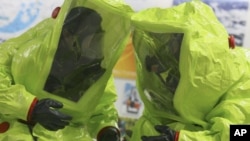North Korea is warning world leaders not to raise the issue of its nuclear weapons during a summit next week in South Korea. The reclusive country says it will consider as a "declaration of war" any statement about the North Korean issue at the Nuclear Security Summit.
At a time when tensions are again quickly escalating on the Korean peninsula, Seoul is about to host dozens of top-level foreign dignitaries - including the presidents of the United State and China.
The Nuclear Security Summit is intended to make it more difficult for terrorists to get their hands on materials to make atomic weapons. But it is will be overshadowed by events just across the Demilitarized Zone.
North Korea Wednesday warned Seoul any resolution at the summit concerning its nuclear program will be a provocation “considered an act of war.”
North Korea issue unavoidable
Although North Korea is not an official topic at the summit, officials here say one-on-one leaders' meetings are certain to discuss Pyongyang's nuclear and missile programs.
Last week, North Korea said it plans to launch a satellite into orbit in mid-April. That announcement was condemned by the international community, which asserts any space launch violates a ban on North Korea utilizing ballistic missile technology.
The announcement also appears to unravel an agreement Pyongyang and Washington jointly announced just weeks ago, on February 29, in which North Korea would freeze some of its nuclear programs in exchange for food aid. Pyongyang, however, says the agreement remains in effect and it is inviting U.N. nuclear inspectors to return to the country.
'Earth observation satellite'
Leon Sigal, who formerly advised the U.S. government on strategy toward North Korea, says it is difficult to imagine future diplomacy between the United States and North Korea if Pyongyang goes ahead with its so-called earth observation satellite launch.
"A rocket launch would be confidence-destroying. Unless it is suspended, fruitful dialogue will come to an end, I’m sorry to say," said Sigal, who was speaking Wednesday at an international conference about Northeast Asia nuclear issues.
South Korean Unification Minister Yu Woo-ik, in a speech Wednesday at a separate international conference here said a launch - which would be North Korea's third attempt - is senseless in a country whose people are hungry and repressed.
Grave provocation
South Korea's point man on North Korea says it would be a grave provocation and a serious security threat to South Korea and the international community.
Japan's government is vowing to take “all possible measures to ensure that people and property are safe” - the latest indication it might try to shoot down the North Korean rocket if it soars over Japanese territory, as indicated by its planned trajectory.
Analysts say North Korea likely has several nuclear weapons but has yet to perfect the technology to make them small enough to place atop a missile. Nor has it demonstrated it can successfully launch such a payload.
Diplomacy is key
Stanford University research professor Siegfried Hecker has visited North Korea seven times. The North Koreans in 2010 revealed to him a facility to enrich weapons-grade uranium.
At Wednesday's regional nuclear issues conference, Hecker said re-engagement and diplomacy with Pyongyang is the only way to try to persuade the North Koreans to give up their nuclear ambitions.
"We should be able to convince them that it’s a much greater liability than it is an asset. But to do that they have to have a sense of security. So there’s a lot of work to be done. And so, we must make the price of keeping the weapons greater than the benefits of giving them up," said Hecker.
De-nuclearization vs. freeze
Speaking at the same conference, the Asia Foundation's Peter Beck argued for a "reality check" in regards to North Korea's nuclear development.
"We can’t de-nuclearize North Korea," he said. "The best we can do is a freeze. And, that’s frankly unacceptable to Washington, to Seoul, certainly for Tokyo, but that is the reality we face. North Korea attaches tremendous meaning and value to being a nuclear power. It’s increasingly tied to their identity."
North Korea watchers are also warning of the likelihood that Pyongyang will soon follow its so-called space launch attempt with a third underground test of a nuclear device.











